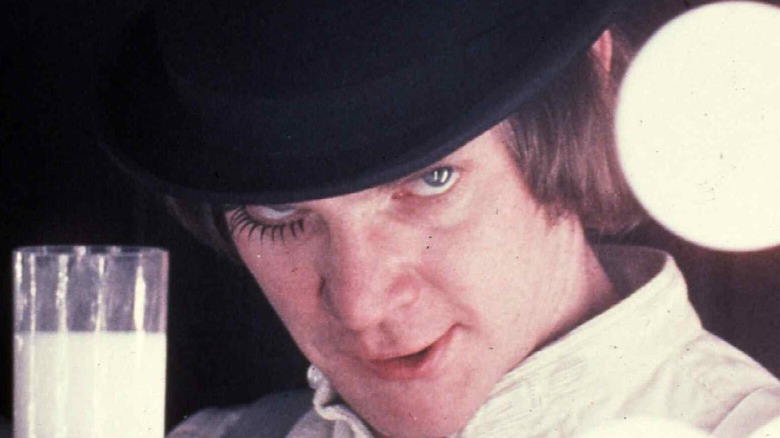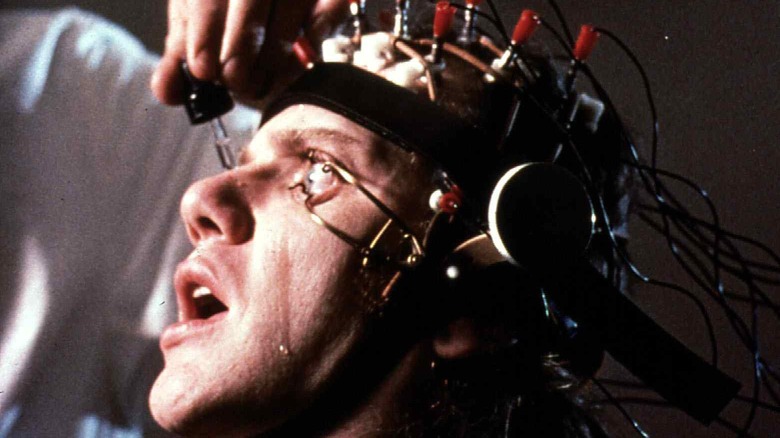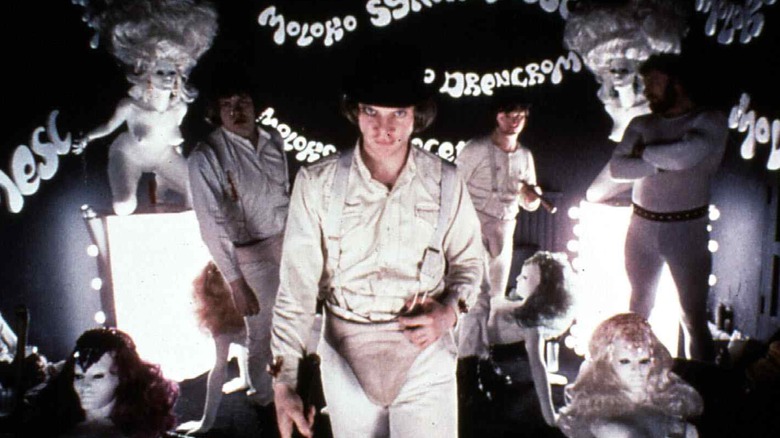Why A Clockwork Orange Was Banned In The UK
It's a bit of an understatement to say that some film critics were not impressed with Stanley Kubrick's "A Clockwork Orange" after its release in 1972. One reviewer, writing in the Philadelphia Daily News, said the film was a "nauseous, revolting, despicable depiction of a man ... in a 'wastland generation'" (via The International Anthony Burgess Foundation). Before the film was released, the British Board of Film Censorship (BBFC) had a special preview screening and issued it an "X-certificate," indicating it was not suitable for audiences under the age of 18.
Eventually, Kubrick removed some scenes to make the film suitable for an "R" rating in the U.S., but perhaps critics' reaction to the film wasn't without reason. According to PBS, it was advertised as "the adventures of a young man whose principal interests are rape, ultra-violence, and Beethoven." In addition, many viewers may remember the film's lead character, Alex DeLarge, undergoing a particularly brutal treatment known as "aversion therapy" (per Slash Film).
Critiquing or inciting violence?
Over time, the unsettling shots of chaos and insanity have brought the film to cult classic status, with Stanley Kubrick's creative and boundary-breaking direction having influenced many directors thereafter. The majority of people understood that Kubrick's exhibition of violence and crime in the film was a critique of existing social structures, but after the film's release, some thought Kubrick encouraged, and even incited violence (via Far Out Magazine). One such violent scene shows Alex DeLarge and his gang of Droogs invading a rich writer's home before they sexually abuse his wife, as The Great Courses Daily notes. It's scenes like these, and many more, which brought a judicial glare down upon Kubrick's now-lauded film.
"A Clockwork Orange" wasn't the only film that critics blamed for allegedly inciting violence, either. Around the same time, the 1976 film "Taxi Driver" was linked to John Hinckley Jr.'s assassination attempt on President Ronald Reagan in 1981, according to The Take. "A Clockwork Orange" was particularly gruesome in some of its violent depictions.
Better safe than sorry
After the film's release, "A Clockwork Orange" was cited in two different court cases involving violent crime in England, according to the Times of Malta. Additionally, another court case involving a Dutch girl raped by a group of men playing "Singing in the Rain" — just as the main character in "A Clockwork Orange" does — seemed to be inspired by the film (via PBS). The reaction against Kubrick's film got personal, as he was often harassed by tabloid newspaper reporters who blamed him for the violence, per Far Out Magazine. According to The Guardian, the media's attention on the film accumulated into Kubrick receiving death threats.
As a result of Kubrick's film's violent scenes, "A Clockwork Orange" was banned in South Africa and Brazil (per The International Anthony Burgess Foundation), and Kubrick himself withdrew the film from screens in the U.K. in 1973 (per PBS). In fact, it wasn't until after Kubrick's death in 1999 that Warner Brothers International announced "A Clockwork Orange" would return to screening in the U.K., 27 years after the auteur had withdrawn the film, according to PBS.


